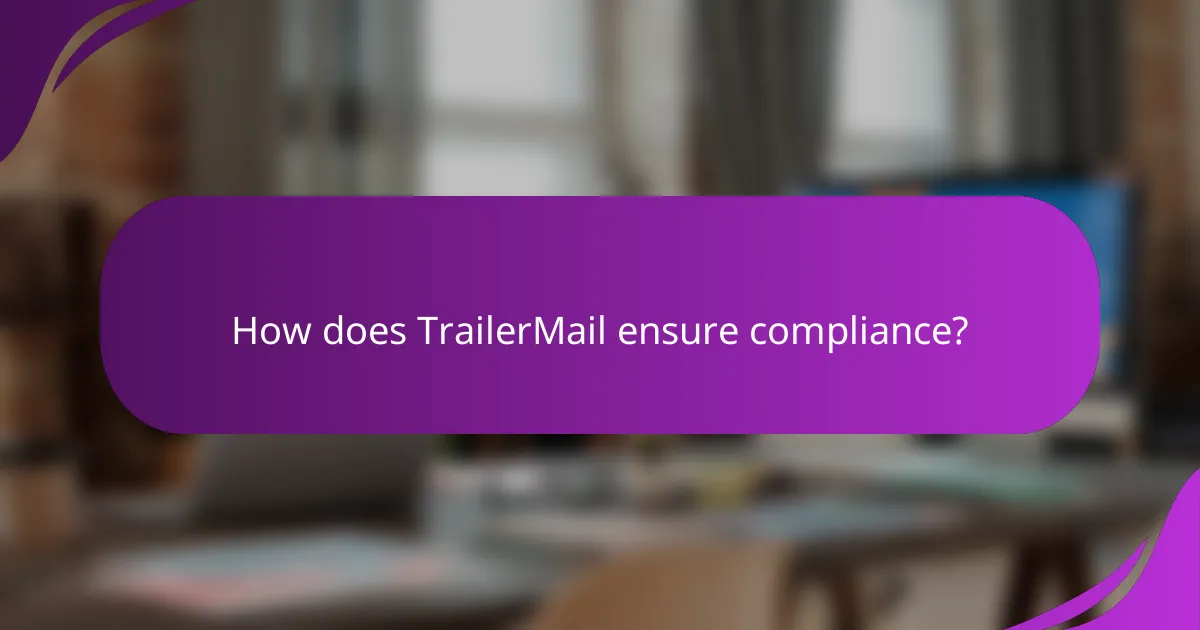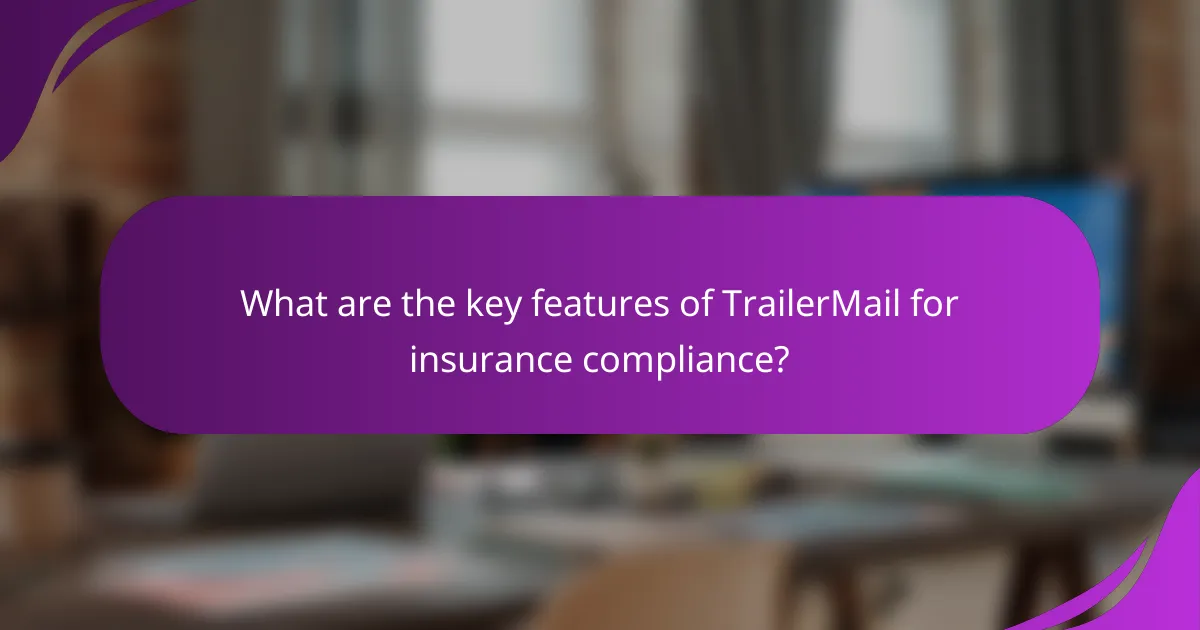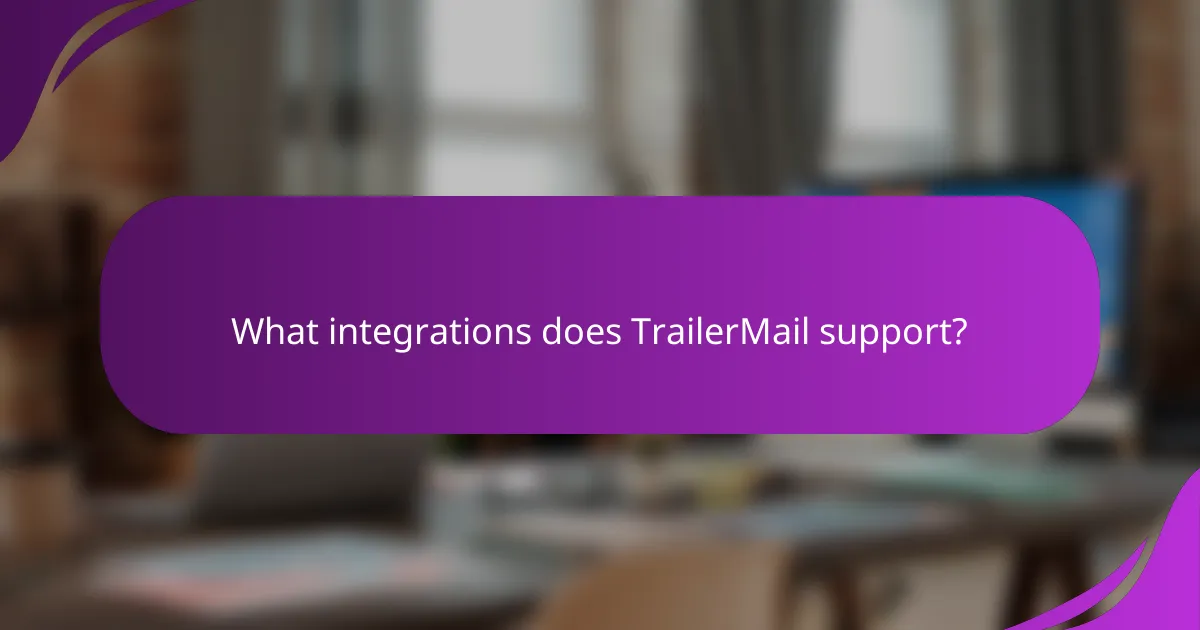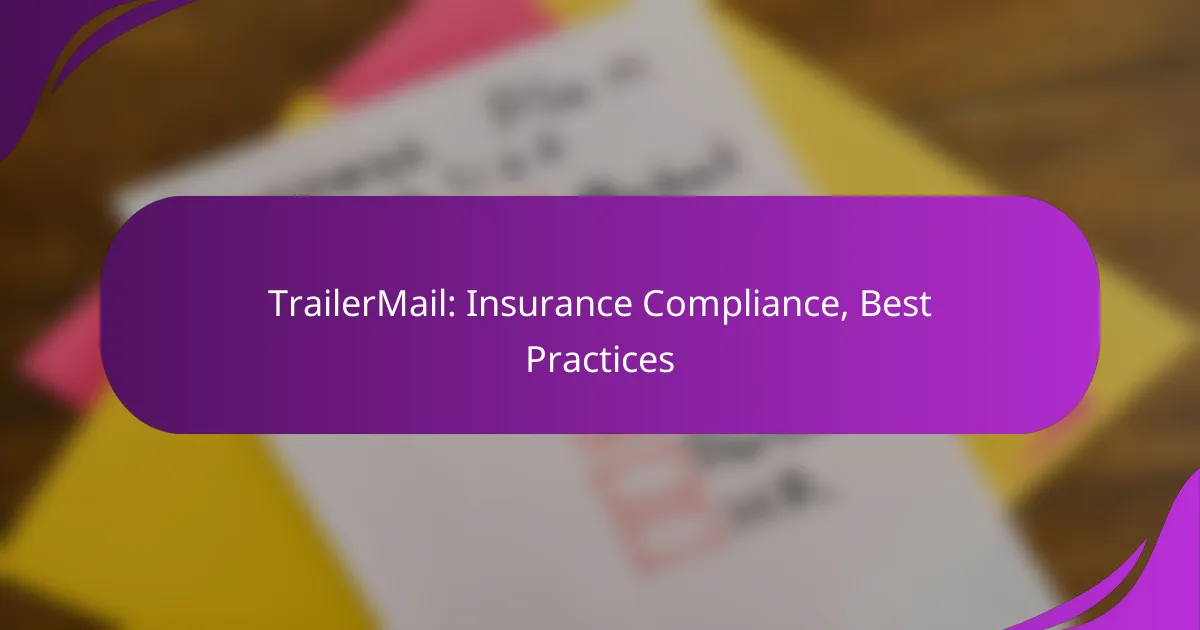TrailerMail provides a comprehensive solution for insurance compliance, integrating automated systems that monitor adherence to regulations. By implementing best practices such as regular audits and employee training, businesses can enhance their operational integrity while efficiently managing compliance requirements. With features like customizable workflows and alerts for regulatory changes, TrailerMail simplifies the compliance process and reduces the risk of errors.

What are the best practices for insurance compliance in the UK?
Best practices for insurance compliance in the UK involve a combination of regular audits, employee training, thorough documentation, effective use of compliance software, and staying informed about regulatory changes. Implementing these practices helps ensure that insurance companies meet legal requirements and maintain operational integrity.
Regular audits and assessments
Conducting regular audits and assessments is crucial for maintaining insurance compliance. These evaluations help identify potential gaps in compliance and areas for improvement. Aim for at least annual audits, but consider more frequent assessments if your business undergoes significant changes.
Utilize both internal and external auditors to gain diverse perspectives. Internal audits can focus on day-to-day operations, while external audits provide an objective review of compliance practices.
Employee training programs
Implementing comprehensive employee training programs is essential for ensuring that staff understand compliance requirements. Training should cover relevant regulations, company policies, and best practices. Schedule training sessions regularly, ideally at least once a year, to keep employees updated.
Consider using a mix of training methods, such as workshops, online courses, and hands-on simulations, to cater to different learning styles. Regularly assess the effectiveness of your training programs through feedback and assessments.
Documentation and record-keeping
Thorough documentation and record-keeping are vital for demonstrating compliance with insurance regulations. Maintain accurate records of policies, claims, communications, and audits. Ensure that all documentation is easily accessible and organized for quick retrieval during audits.
Establish a clear policy for record retention, including how long to keep documents based on regulatory requirements. Regularly review and update records to ensure they reflect current practices and regulations.
Utilizing compliance software
Utilizing compliance software can streamline the process of managing insurance compliance. These tools help automate documentation, track regulatory changes, and facilitate audits. Look for software solutions that offer features tailored to the insurance industry, such as risk assessment and reporting capabilities.
When selecting compliance software, consider factors like user-friendliness, integration with existing systems, and customer support. Regularly update the software to ensure it remains compliant with the latest regulations.
Staying updated with regulations
Staying updated with regulations is critical for maintaining insurance compliance in the UK. Regularly review changes in laws and industry standards, and subscribe to relevant newsletters or regulatory bodies for updates. Assign a compliance officer or team to monitor these changes actively.
Participate in industry conferences and workshops to stay informed about emerging trends and best practices. Networking with other professionals can also provide insights into effective compliance strategies.

How does TrailerMail ensure compliance?
TrailerMail ensures compliance by implementing a series of automated systems and integrations that monitor and verify adherence to insurance regulations. These features streamline the compliance process, reducing the risk of errors and ensuring timely updates to regulatory changes.
Automated compliance checks
Automated compliance checks are a key feature of TrailerMail, designed to continuously monitor insurance policies against current regulations. This system flags any discrepancies or lapses, allowing users to address issues promptly. Regular automated checks help maintain compliance without the need for extensive manual oversight.
For example, if a policy is about to expire or does not meet specific state requirements, the system will alert the user, ensuring proactive management of compliance issues.
Integration with regulatory databases
TrailerMail integrates seamlessly with various regulatory databases, providing real-time access to the latest compliance requirements. This integration allows users to verify that their insurance policies are up-to-date with local regulations, which can vary significantly by state or country.
By connecting to these databases, TrailerMail helps users avoid potential fines and legal complications that can arise from outdated or incorrect information. Regular updates from these sources ensure that compliance checks are based on the most current data available.
Real-time reporting features
Real-time reporting features in TrailerMail enable users to generate compliance reports instantly, providing a clear overview of their insurance status. These reports can highlight areas that require attention, such as missing documentation or policies that are not compliant with current regulations.
Users can customize reports to focus on specific metrics, making it easier to track compliance over time. This capability not only aids in maintaining compliance but also prepares users for audits or regulatory reviews, ensuring they have all necessary documentation readily available.

What are the key features of TrailerMail for insurance compliance?
TrailerMail offers essential features that streamline insurance compliance, ensuring that businesses meet regulatory requirements efficiently. Key functionalities include customizable workflows, alerts for regulatory changes, and robust data security measures.
Customizable compliance workflows
TrailerMail allows users to create tailored compliance workflows that fit their specific operational needs. This customization helps organizations manage documentation, approvals, and audits more effectively, reducing the risk of non-compliance.
For example, businesses can set up workflows that automatically route documents to the appropriate personnel for review, ensuring that all compliance checks are completed in a timely manner. This flexibility can significantly enhance operational efficiency.
Alerts for regulatory changes
With TrailerMail, users receive timely alerts about changes in insurance regulations that may affect their compliance status. These notifications help organizations stay informed and adapt their practices accordingly, minimizing the risk of penalties.
Alerts can be customized based on specific jurisdictions or types of insurance, ensuring that users only receive relevant updates. This proactive approach allows businesses to maintain compliance without constant manual monitoring.
Data security measures
Data security is a critical aspect of insurance compliance, and TrailerMail implements strong measures to protect sensitive information. Features such as encryption, access controls, and regular security audits help safeguard data from unauthorized access.
Organizations can also benefit from compliance with industry standards, ensuring that their data handling practices meet or exceed regulatory requirements. This focus on security not only protects client information but also enhances trust in the organization’s operations.

What are the pricing plans for TrailerMail?
TrailerMail offers flexible pricing plans designed to accommodate various user needs, including monthly subscriptions and annual discounts. Understanding these options can help you choose the best plan for your insurance compliance and communication requirements.
Monthly subscription options
TrailerMail provides several monthly subscription tiers, allowing users to select a plan that fits their budget and usage needs. Typically, these plans range from basic to premium, with features scaling accordingly. Basic plans might include essential services, while premium options offer advanced tools for compliance tracking and reporting.
When choosing a monthly plan, consider how frequently you will use the service and which features are most critical for your operations. This can help you avoid paying for unnecessary features while ensuring you have the tools you need.
Annual pricing discounts
For users looking to save, TrailerMail offers significant discounts for annual subscriptions compared to monthly payments. These discounts can often reach up to 20-30%, making it a cost-effective option for long-term users. Paying annually also simplifies budgeting by locking in your rate for the year.
Before committing to an annual plan, evaluate your expected usage over the next year to ensure it aligns with your needs. This approach can prevent overcommitting to a service that may not be fully utilized.
Free trial availability
TrailerMail typically offers a free trial period, allowing potential users to explore the platform and its features without financial commitment. This trial usually lasts for a limited time, such as 14 to 30 days, giving you ample opportunity to assess the service’s suitability for your compliance needs.
During the trial, take advantage of all available features to fully understand how TrailerMail can enhance your operations. Be sure to evaluate customer support and user experience, as these factors can significantly impact your overall satisfaction with the service.

What integrations does TrailerMail support?
TrailerMail supports a variety of integrations designed to enhance insurance compliance and streamline operations. These integrations include accounting software, CRM systems, and API access for custom solutions, allowing users to tailor the platform to their specific needs.
Accounting software integrations
TrailerMail integrates with popular accounting software to simplify financial management. Users can connect systems like QuickBooks, Xero, and FreshBooks to automate invoicing, expense tracking, and financial reporting.
When choosing an accounting integration, consider the compatibility with your existing systems and the ease of data transfer. Look for features like real-time updates and automated reconciliation to save time and reduce errors.
CRM system compatibility
TrailerMail is compatible with various CRM systems, which helps manage client relationships more effectively. Integrations with platforms such as Salesforce, HubSpot, and Zoho allow for seamless data sharing and improved customer communication.
Ensure that the CRM you choose supports the specific features you need, such as lead tracking and automated follow-ups. This can enhance your sales process and improve client engagement.
API access for custom solutions
For businesses with unique requirements, TrailerMail offers API access to create custom solutions. This allows developers to build tailored applications that integrate with existing workflows and systems.
When utilizing API access, consider the technical expertise required for implementation and maintenance. Proper documentation and support can facilitate a smoother integration process, ensuring that your custom solution meets your operational needs.

What are common challenges in insurance compliance?
Insurance compliance often faces challenges such as regulatory complexity, data management issues, and evolving industry standards. Organizations must navigate a landscape of local and national regulations while ensuring that their practices align with these requirements.
Regulatory Complexity
Regulatory complexity is a significant hurdle in insurance compliance. Different jurisdictions may have varying laws and regulations, making it difficult for companies operating in multiple regions to maintain compliance. Staying updated on these regulations requires ongoing education and resources.
To manage this complexity, companies should establish a compliance team dedicated to monitoring changes in legislation. Regular training sessions can help ensure that all employees are aware of the latest requirements and best practices.
Data Management Issues
Data management issues can hinder effective insurance compliance. Insurers must collect, store, and process vast amounts of sensitive information while adhering to data protection regulations. Poor data management can lead to compliance violations and potential financial penalties.
Implementing robust data governance policies is essential. This includes regular audits of data handling practices and investing in secure technology solutions to protect client information. Companies should also train staff on data privacy standards to minimize risks.
Evolving Industry Standards
Evolving industry standards pose another challenge for insurance compliance. As technology advances and consumer expectations change, insurers must adapt their practices to meet new benchmarks. Failure to do so can result in non-compliance and loss of market competitiveness.
To keep pace with these changes, insurers should participate in industry forums and engage with regulatory bodies. Regularly reviewing and updating internal policies and procedures can help ensure alignment with current standards and enhance overall compliance efforts.
